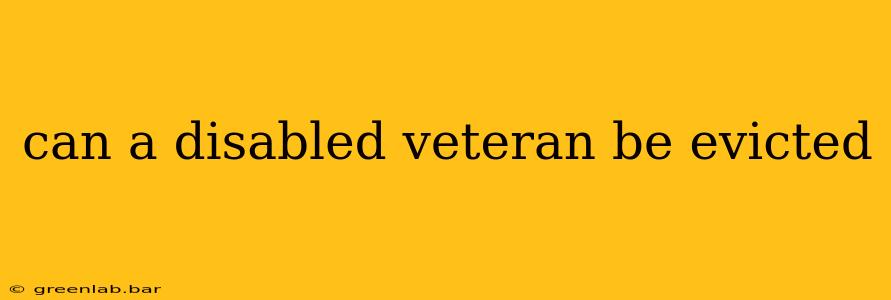Can a Disabled Veteran Be Evicted? Understanding Federal and State Protections
The question of whether a disabled veteran can be evicted is complex, depending heavily on several factors including the specific circumstances of the eviction, the type of housing, and applicable federal and state laws. While there's no blanket protection against eviction solely based on being a disabled veteran, several legal avenues could prevent an eviction or offer additional recourse.
Federal Protections:
The Fair Housing Act (FHA) prohibits discrimination in housing based on disability. This means landlords cannot evict a tenant solely because of their disability, including disabilities related to military service. However, the FHA requires a tenant to have a disability that substantially limits one or more major life activities. Simply being a veteran with a disability doesn't automatically trigger FHA protections; the disability itself must meet the FHA's definition.
Furthermore, the FHA does not automatically prevent eviction for all reasons. A landlord can still evict a disabled veteran for legitimate reasons, such as non-payment of rent, violation of lease terms, or engaging in illegal activity on the property. The key is that the disability cannot be the primary reason for the eviction.
State and Local Protections:
Many states have additional laws offering further protection to disabled veterans or tenants with disabilities. These protections can vary significantly, so understanding the specific laws in your state is crucial. Some states may offer:
- Extended eviction notice periods: Some states might require landlords to provide longer notice periods before initiating eviction proceedings for tenants with disabilities.
- Reasonable accommodations: Landlords may be required to make reasonable accommodations for a tenant's disability, even if it involves modifying the property. This could range from installing ramps to providing modified appliances. Failure to make reasonable accommodations could be grounds for legal action, potentially preventing eviction.
- Specific protections for veterans: Some states have enacted laws specifically protecting veterans, providing additional rights and safeguards against eviction that go beyond general disability protections.
Situations Where Eviction Might Be Justified:
Even with disability and veteran status, eviction is still possible under certain circumstances:
- Non-payment of rent: This is the most common reason for eviction and applies to all tenants, regardless of disability or veteran status.
- Lease violations: Violating the terms of the lease agreement can lead to eviction. This could include damaging the property, having unauthorized pets, or exceeding occupancy limits.
- Illegal activity: Engaging in illegal activities on the property is a valid reason for eviction.
- Failure to comply with reasonable requests: If a landlord requests a tenant to address a specific issue (e.g., repair damage) and the tenant fails to comply, eviction could be a consequence.
What to Do If Facing Eviction:
If you're a disabled veteran facing eviction, you should immediately:
- Review your lease agreement: Understand the terms of your lease and whether any clauses have been violated.
- Contact your local legal aid society or a tenant rights organization: These organizations can provide free or low-cost legal assistance and advise you on your rights.
- Document everything: Keep detailed records of all communication with your landlord, including any notices, emails, or other correspondence.
- Seek assistance from the Department of Veterans Affairs (VA): The VA offers various resources and support services for veterans, which might include assistance with housing issues.
Disclaimer: This information is for general educational purposes only and is not intended as legal advice. The specific laws and regulations regarding eviction vary by location, and it is essential to consult with a legal professional for advice tailored to your individual circumstances. The information provided here should not substitute professional legal counsel.

